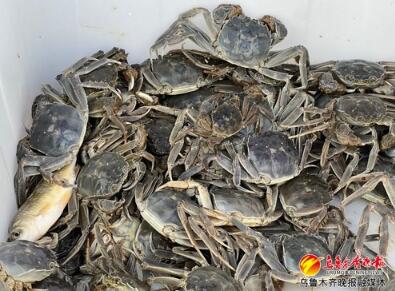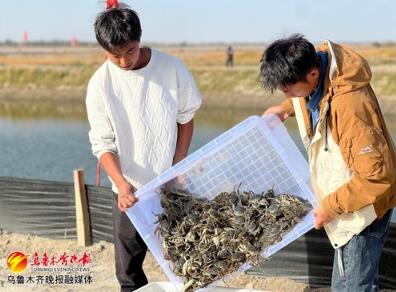On the afternoon of October 30, 2024, at the aquaculture base in Tuoleganji Village of Ying’airike Township, Hetian County, a small boat docked at the shore while workers were busy hauling the crab traps and capturing. The crab traps were filled with large and lively crabs, displaying their claws energetically. These crabs will undergo sorting, weighing, packaging, and shipping to various places.

Photo taken on October 30, 2024 shows staff members showcase the freshly caught crabs at the aquaculture base of Xinjiang Kunlun Youpin Ecological Agriculture Development Co., Ltd. in Hetian County, Hotan Prefecture, northwest China's Xinjiang Uygur Autonomous Region. (Photo by Wang Yu)
Can crabs be farmed on the edge of the desert? On that day, a research delegation focusing on high-quality development visited the aquaculture base of Xinjiang Kunlun Youpin Ecological Agriculture Development Co., Ltd. in Hetian County to find out.
Located on the southern edge of the Taklimakan Desert, Hetian County is characterized by arid conditions and poor soil quality. In recent years, the county has actively explored a path of high-quality development suitable for the local condition, promoting aquaculture in desert areas.
This year, Hetian County has introduced Xinjiang Kunlun Youpin Ecological Agriculture Development Co., Ltd. to launch a new project at Tuoleganji Village in Ying’airike Township, which involves farming crabs in the desert. It has not only generated economic benefits but also provided new insights into the utilization of saline-alkali land.
"The weak alkalinity of the soil makes it challenging for most crops and plants to thrive, yet it creates favorable conditions for crab farming," said Wang Hui, general manager of Xinjiang Kunlun Youpin Agricultural Development Co., Ltd. He explained that the salinity in saline-alkali land meets the mineral requirements for crab growth, serving as a nutrient source. Freshwater-farmed crabs exhibit early maturity, maturing 10 to 15 days earlier than those from other regions, and their meat is firm and delicious.

Photo shows crabs cultivated at the breeding base of Xinjiang Kunlun Youpin Ecological Agriculture Development Co., Ltd. in Hetian County, Hotan Prefecture, northwest China's Xinjiang Uygur Autonomous Region. (Photo by Wang Yu)
This year, with guidance of experts, the breeding base completed essential tasks such as pond renovation, disinfection, fertilization, and aquatic vegetation planting. Between April and May, approximately 300,000 crab seedlings from east China's Jiangsu Province were raised in three batches.
The enterprise employs an ecological aquaculture method characterized by "adding water without replacing it." This approach involves planting aquatic plants and introducing snails to cultivate a substantial population of microbial feed, thereby creating a more conducive environment for crab growth.
The aquaculture base has also established a stringent daily management system, where technicians meticulously record the growth, molting, and feeding quantities of the crabs each day, while closely monitoring ecological indicators such as water temperature, unwanted fish, and aquatic pests. This refined management model has not only enhanced the survival rate and quality of the crabs but has also significantly reduced farming costs.
After several months of scientific management and careful maintenance, a bountiful harvest of crabs was achieved in early September, with most male crabs exceeding 150 grams, which were met with enthusiastic market demand upon release.
"I didn't expect the initial trial to go so smoothly, which has greatly boosted my confidence," said Wang Hui. Local residents purchased the freshly caught shrimp and crabs on-site, leading to a supply shortage. The quality of the crabs has received widespread acclaim, with many praising the tender meat and the lack of fishy odor.

Photo taken on October 30, 2024 shows staff members sort crabs at the aquaculture base of Xinjiang Kunlun Youpin Ecological Agriculture Development Co., Ltd. in Hetian County, Hotan Prefecture, northwest China's Xinjiang Uygur Autonomous Region. (Photo by Wang Yu)
He Yisheng, who hails from Pu'er City, southwest China's Yunnan Province, has begun working at the aquaculture base in March this year together with his brother, and currently serves as a supervisor in Area Two of the base.
"I am learning aquaculture techniques while working, and I earn 6,000 yuan a month. I am very satisfied and believe that crab farming in this region has great potential," He Yisheng said.
Wang Hui explained that the company's aquaculture base spans about 22 hectares and has already produced 18 tons of crabs for market.
The company will also expand the range of high-quality, high-value aquaculture products based on crab farming, including the cultivation of crayfish, giant freshwater prawn, white shrimp from South America, and bass, thereby establishing a local seafood farming brand, enhancing farming efficiency, and helping more farmers increase their income and achieve prosperity.
(Original source: Urumqi Evening News, Reporter Wang Yu)









